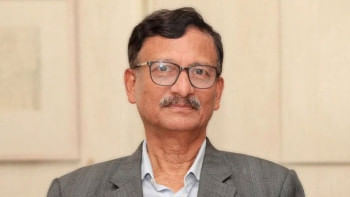Talented people, compliance key to bank’s sound finance

"I think a combination helps," Andy Halford, group chief financial officer of Standard Chartered, told The Daily Star in an interview in Dhaka last week.
Halford was appointed group chief financial officer of Standard Chartered plc in July 2014 and CFO of Standard Chartered Bank in April 2019.
He has a strong finance background and deep experience of managing complex international businesses across dynamic and changing markets.
He worked as finance director at East Midlands Electricity plc, as financial director for Vodafone, and as CFO for Verizon Wireless in the US.
As the group CFO at Standard Chartered, he is responsible for the finance, treasury, corporate development, strategy, investor relations, property and supply chain management functions.
"Standard Chartered operates in about 60 markets and Bangladesh is among the markets which are growing very fast."
Speaking about the underlying factors behind Bangladesh's steady run of growth, he cited the examples of a number of Asian countries where skilled workforce is increasing, education standards are rising and there is an increasing sense of entrepreneurialism.
The products that are made are also of high quality and they are being sought after in other parts of the world as the prices are competitive.
"And we see all of those ingredients present here at this point in time. There is also a strong sense that these conditions are well-managed as the country moves forward."
For any bank operating in a country where the economy is growing fast is a great opportunity and the bank saw very significant growth in Bangladesh, according to Halford.
The opportunities really come from businesses that are growing, so there are also new parts of the economy that are taking off. There are opportunities in the digital space.
"Hence, we are delighted that we have a presence in the country and we have had a presence in the country for well over a century. We, genuinely, are very enthused by the growth outlook for the country which is a good thing for us and our business."
"In turn, hopefully we can help in our own small way with the future growth of the country."
Halford preferred not to comment about the conditions of the other banks in Bangladesh.
Rather, he said: "I think every country has got a wide range of banks. It is important for us to run a high quality business that our clients recommend to their friends, that we apply high ethical standards and that we are good citizens in the country in which we operate."
Speaking about the future of banking, Halford said: "We do see the future as being a very digital bank and supplemented by select branch locations. And that is what we are doing in most of the countries in which we operate."
Naser Ezaz Bijoy, chief executive officer of Standard Chartered Bangladesh, who accompanied Halford during the interview, supplemented the CFO, saying the adoption rate of online banking is actually quite encouraging in Bangladesh.
On the retail banking, there are a lot more opportunities coming up.
Halford said Standard Chartered is a universal bank and serves consumers, small businesses and large businesses.
"Therefore we really cover the whole range of customers and products. And we believe we are very well-positioned to provide a full suite of services to businesses as they progressively grow over time."
He said he does not think Brexit will have meaningful first order impact on the bank's operations globally and especially in Bangladesh.
"In fact globally, most of our activities are in Asia, Middle East and Africa. So, although we do have a head office in the UK and we do have corporate activities in the UK, overall our activities in between Europe and the UK are relatively quite a small part of our business."
Speaking about the US-China trade war, he said: "We watch out with as much interest I think as many others do."
Standard Chartered is a significant bank in China and has been operating in the country for more than 160 years and its business is doing very well. It is the seventh largest clearer of US dollars in the US.
However, only a small part of the trade that the bank finances is actually between the US and northern Asia. There might not be a significant direct impact on the bank although the secondary impacts on the supply chains is clearly of some relevance, according to Halford.
Some of the trade flow from China to the US may divert to within Asia. "And given that we have a presence in most Asian countries, we are uniquely well-positioned to be able to assist even if the trade flows do change the pattern."
As a large bank in China it is in touch with many large businesses.
When asked whether Chinese companies are interested to invest more in Bangladesh, Halford replies: "I think that it varies by sector. Those sectors that are potentially impacted by the tariffs obviously are having to give it more thoughts."
Some clients are looking at whether there are other locations that they could use as a manufacturing base and that include a number of Asian countries. Bangladesh is one potential country that manufacturers could move to.
Bijoy added: "Some clients are looking for options to have China plus one and it can be Bangladesh or Vietnam or others. So, we need to be more competitive to get that share."
However, if the global economy slows down, there could be a potential for Chinese operators to look at alternative markets such as the EU, which is also a big market for Bangladesh.
"So, we may face more competition in those markets than what we are facing now," Halford added.


 For all latest news, follow The Daily Star's Google News channel.
For all latest news, follow The Daily Star's Google News channel. 



Comments